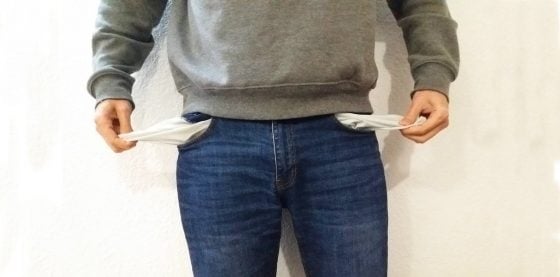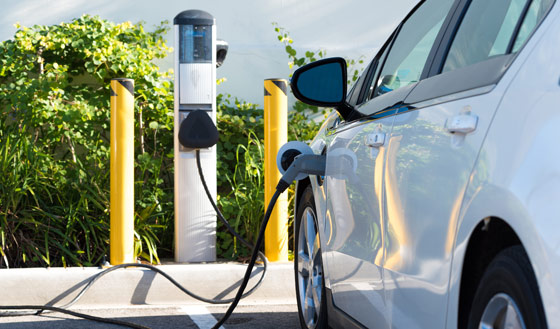This article was originally published by Michael Snyder at The Economic Collapse Blog.

We better hope that the U.S. economy holds together in 2020 because if there is any sort of major economic crisis much of the country is going to be broke almost immediately. Today, close to half of all Americans are living on the edge financially. For many, it is out of necessity, but for others, it is a conscious choice.
Way too many people out there see no need to build up a substantial financial cushion because they have a tremendous amount of faith in the system. They don’t think that things will ever get too bad in this country, and so there is no urgency to put funds away for a rainy day. But even if authorities could somehow prevent an economic downturn from ever happening again, individual emergencies are taking place all around us on a constant basis. Cars break down, people get sick, and accidents happen. Unfortunately, most Americans are completely unprepared for some sort of emergency to strike. In fact, a brand new survey has discovered that just 41 percent of Americans could cover a $1,000 emergency expense using their current savings…
Bankrate’s January Financial Security Index survey reveals that just four in 10 U.S. adults (41 percent) would cover the cost of a $1,000 car repair or emergency room visit using savings. The findings echo what previous Bankrate studies and others — including the Federal Reserve and the Pew Charitable Trusts — have found about Americans’ lack of rainy-day savings.
So where would everyone else get the money for an emergency?
Well, most of them would either borrow the money or get it from a relative.
And usually, an emergency costs a lot more than $1,000. Here is more from the Bankrate survey…
Emergencies often aren’t cheap. Among survey respondents who said they or their family members dealt with an unexpected expense in the past 12 months, the median amount of the largest expense was $1,750.
Three in 10 adults (29 percent) said they or their family members spent at least $5,000 in the past year to cover an unanticipated cost.
The bottom line is that most of the country is living paycheck to paycheck, and most Americans are just one small step away from financial disaster.
Back in 2008, millions of Americans suddenly lost their jobs, and because so many of them were living on the edge financially a lot of them suddenly couldn’t pay their mortgages.
You would think that we would have learned something from that very painful experience, but we didn’t.
So we better hope that the U.S. economy remains relatively stable because a serious downturn would be very ugly.
Unfortunately, an increasing number of experts are warning that our luck is about to run out. In fact, the head of the IMF recently warned that we could potentially be facing another “Great Depression”…
The head of the International Monetary Fund has warned that the global economy risks a return of the Great Depression, driven by inequality and financial sector instability.
Speaking at the Peterson Institute of International Economics in Washington, Kristalina Georgieva said new IMF research, which compares the current economy to the “roaring 1920s” that culminated in the great market crash of 1929, revealed that a similar trend was already under way.
That certainly doesn’t sound good at all.
Here in the United States, most people have been choosing to ignore all the signs that the economy is starting to really slow down.
But as stores and businesses continue to close down all over the nation, it is going to become very difficult to ignore all of the empty buildings.
For example, Macy’s just announced that they will be closing nearly 30 stores…
Macy’s is closing roughly more than two dozen stores as troubles mount for the storied retailer.
The company confirmed to CNN Business that it’s shuttering 28 Macy’s locations and one Bloomingdale’s location in the coming months. Closures affect locations in several states, including Florida, California and Georgia, according to lists compiled from various media reports.
And one of the most prominent mall retailers in the entire country has just announced that they will be closing 91 stores…
Fashion retailer Express plans to close 91 stores as part of a “fleet rationalization” after a sales slump during the holidays.
The move comes amid a rash of store closures following the holiday shopping season.
Of course, I could go on and on all day. Here are just a couple more examples of major retailers that are closing down stores…
Bed Bath & Beyond is closing 60 locations, with the list being revealed Tuesday. And Schurman Retail Group plans to close its Papyrus and American Greetings stores, totaling about 254 locations, within the next four to six weeks.
But despite all of the evidence to the contrary, the irrational optimists would still have us believe that America has entered a new era of tremendous economic prosperity.
I actually wish that was true.
Sadly, decades of exceedingly bad decisions are catching up with us in a major way, and instead of changing course we continue to steamroll toward a date with destiny.
Right now I am going to share with you the number one piece of advice that I give to everyone who asks about preparing for the great storm that is ahead.
Build up a financial cushion.
When things get bad, you are going to need money.
I know that sounds exceedingly simple, but obviously most of the country is choosing not to do this.
Instead, most of the country is surviving from month to month with barely any money in their bank accounts, and so when disaster strikes they are going to be looking for someone else to rescue them.
We have had more than a decade since the crisis of 2008 to prepare for the next one, but most people are acting as if the next one will never arrive.
Unfortunately, the truth is that the next crisis has already started, and businesses all over the nation are going bankrupt.
But most Americans won’t realize what is happening until things really start getting out of hand, and by then it will be far too late to make any sort of preparations.
About the Author: I am a voice crying out for change in a society that generally seems content to stay asleep. My name is Michael Snyder and I am the publisher of The Economic Collapse Blog, End Of The American Dream and The Most Important News, and the articles that I publish on those sites are republished on dozens of other prominent websites all over the globe. I have written four books that are available on Amazon.com including The Beginning Of The End, Get Prepared Now, and Living A Life That Really Matters. (#CommissionsEarned) By purchasing those books you help to support my work. I always freely and happily allow others to republish my articles on their own websites, but due to government regulations, I need those that republish my articles to include this “About the Author” section with each article. In order to comply with those government regulations, I need to tell you that the controversial opinions in this article are mine alone and do not necessarily reflect the views of the websites where my work is republished. This article may contain opinions on political matters, but it is not intended to promote the candidacy of any particular political candidate. The material contained in this article is for general information purposes only, and readers should consult licensed professionals before making any legal, business, financial or health decisions. Those responding to this article by making comments are solely responsible for their viewpoints, and those viewpoints do not necessarily represent the viewpoints of Michael Snyder or the operators of the websites where my work is republished. I encourage you to follow me on social media on Facebook and Twitter, and anyway that you can share these articles with others is a great help.









0 Comments